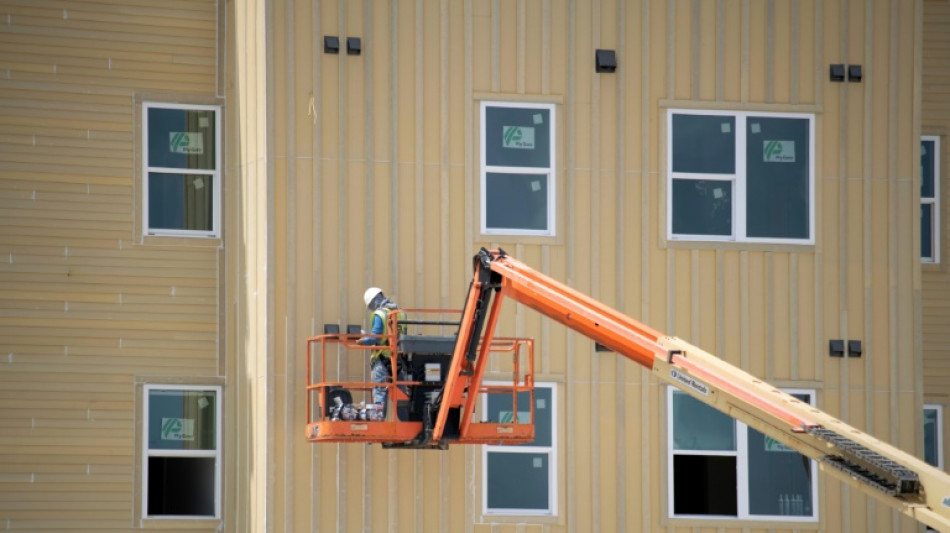Perched on a platform as he painted an enormous wall, Maynor Alvarez felt cramps in his arms and legs and thought he might vomit. He wanted to come down, but the supervisor's order was clear: "Keep working."
The crushing heatwave that has blanketed much of the southern United States for nearly a month has taken a particularly high toll on construction workers, who are often exposed to temperatures exceeding 105 degrees Fahrenheit (41 degrees Celsius).
And the region is bracing for more heat records to be broken this weekend.
"I've suffered heat strokes on several occasions," the 42-year-old Alvarez told a group of co-workers outside the Houston City Hall on Friday. "Do you know what it feels like? Cramps in the legs and arms, headache, the urge to vomit, your heart racing.
"When I complain to my supervisor down below, he just tells me to keep producing...
"I come down anyway because I can't stand it... If I stayed five more minutes, I wouldn't be here to tell this story."
The workers were there to protest a law recently signed by Republican Governor Greg Abbott which prevents cities like Austin and Dallas from requiring that construction workers be allowed regular water breaks.
The new Law 2127, which takes effect in September, targets local regulations -- on a broad range of issues from labor, to agriculture to finance -- that go beyond state law.
The measure, approved by the state's Republican legislature and governor, is ostensibly intended to prevent cities and counties from conflicting with state law -- but it also weakens the power of local authorities, which are often much more liberal.
For Guatemalan-born Alvarez, the impact is clear: "This is a law that kills," he said.
Some 12 miles (20 kilometers) further north, 28-year-old Juan -- who declined to give his last name -- was on a ladder working to complete a wall on a building under construction. The day was scorching hot, the sun was blindingly bright, and a mist seemed to envelop people passing on the asphalt below.
Wearing a helmet, a reflective vest, protective glasses and a kerchief to keep the sun off his neck, Juan said the heat left him feeling nauseated.
"Just when I take a drink of water, I get dizzy, I want to vomit because of the heat," he told AFP. "I need something else, a Coca-Cola, a Gatorade -- and cold -- just to be able to keep going."
His 21-year-old colleague Edwin, who like Juan is Mexican-born, comes prepared with a cold drink as he readies to work under the sun after finishing a job inside the building. "I'm almost used to it," he said, "but this year the heat is stronger."
- Cost of complaining -
Complaining about the heat can carry a cost, said Alvarez: one may not be scheduled to work as many shifts. So people are reluctant to speak up.
Luz Martínez, another construction worker protesting outside the Houston City Hall, said she had worked in a 20-story building where it was prohibited to bring water. Workers had to go down to the ground level to hydrate outdoors.
"On July 4, the holiday, we were remodeling a school, in an enclosed area with the air conditioning turned off, because they didn't want to pay for the electricity. I remember a colleague falling over because of the heat. He fainted and started vomiting."
"Those places are extremely hot... we're dying," she said. "For them to take away our water, our hydration breaks, is not fair."
The workers were galvanized by the death of a 46-year-old colleague, Felipe Pascual, in mid-June. He collapsed while doing cement work at a construction site on the outskirts of Houston.
Texas holds the unfortunate distinction of having had the most heat-related deaths among construction workers: 42 from 2011 to 2021, according to the US Bureau of Labor Statistics.
Cristian Canela, a representative of the International Union of Painters and Allied Trades, said periodic water breaks are a necessity for people working under the sun.
It's not possible for construction workers to always be in the shade, he said. "I mean, that's common sense, you're a construction worker. But at least you have those water breaks. I think it's essential."
Of Governor Abbott's ban on water breaks, he said, "That's insane."
The conditions, Canela added, are "killing the workers right now."
P.Raval--BD
